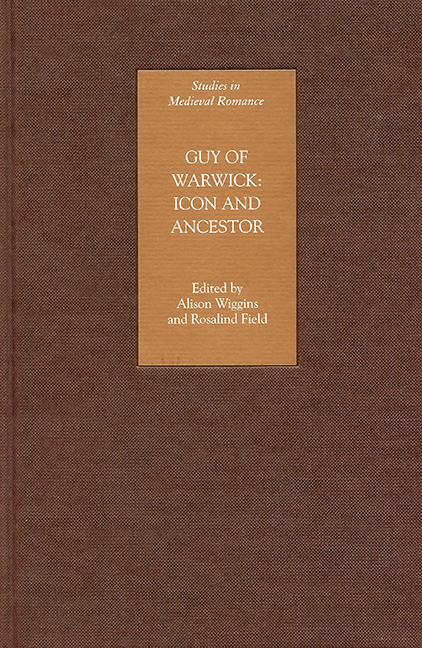Book contents
- Frontmatter
- Contents
- Illustrations
- Contributors
- Abbreviations
- Dedication
- Editorial Introduction: Namoore of this! How to read Guy of Warwick and why
- 1 Gui de Warewic at Home and Abroad: A Hero for Europe
- 2 Gui de Warewic in its Manuscript Context
- 3 Guy of Warwick as a Translation
- 4 From Gui to Guy: The Fashioning of a Popular Romance
- 5 The Manuscripts and Texts of the Middle English Guy of Warwick
- 6 The Speculum Guy de Warwick and Lydgate's Guy of Warwick: The Non-Romance Middle English Tradition
- 7 An Exemplary Life: Guy of Warwick as Medieval Culture-Hero
- 8 The Visual History of Guy of Warwick
- 9 ‘In her owne persone semly and bewteus’: Representing Women in Stories of Guy of Warwick
- 10 Of Dragons and Saracens: Guy and Bevis in Early Print Illustration
- 11 Guy of Warwick and The Faerie Queene, Book II: Chivalry Through the Ages
- 12 Guy as Early Modern English Hero
- Appendix: Synopsis of the Guy of Warwick narrative
- Index
6 - The Speculum Guy de Warwick and Lydgate's Guy of Warwick: The Non-Romance Middle English Tradition
Published online by Cambridge University Press: 24 October 2017
- Frontmatter
- Contents
- Illustrations
- Contributors
- Abbreviations
- Dedication
- Editorial Introduction: Namoore of this! How to read Guy of Warwick and why
- 1 Gui de Warewic at Home and Abroad: A Hero for Europe
- 2 Gui de Warewic in its Manuscript Context
- 3 Guy of Warwick as a Translation
- 4 From Gui to Guy: The Fashioning of a Popular Romance
- 5 The Manuscripts and Texts of the Middle English Guy of Warwick
- 6 The Speculum Guy de Warwick and Lydgate's Guy of Warwick: The Non-Romance Middle English Tradition
- 7 An Exemplary Life: Guy of Warwick as Medieval Culture-Hero
- 8 The Visual History of Guy of Warwick
- 9 ‘In her owne persone semly and bewteus’: Representing Women in Stories of Guy of Warwick
- 10 Of Dragons and Saracens: Guy and Bevis in Early Print Illustration
- 11 Guy of Warwick and The Faerie Queene, Book II: Chivalry Through the Ages
- 12 Guy as Early Modern English Hero
- Appendix: Synopsis of the Guy of Warwick narrative
- Index
Summary
The two verse works discussed in this chapter, the Speculum Guy de Warwick and Lydgate's Guy of Warwick, have in common their radical realignment of the Guy of Warwick narrative. In both the figure of Guy is moved from the world of romance into the orbit of devotional literature and reconstituted in ways that provide testimony to the associative adaptability of the legendary knight. Such new formulations have an intrinsic interest that is heightened by the demonstrable extent of their appeal to medieval audiences. The factors that led to them achieving such a degree of popularity invite examination both of the intrinsic qualities of the works themselves and of the surviving forms in which they were transmitted.
The poem now generally known as the Speculum Guy de Warwick, which in its fullest form runs to 1034 lines, in couplets, recounts the desire of an ‘erle of gode fame, / Gy of Warwyk’ (29–30), to seek Christian guidance from ‘a god man […] / þat liued al in godes lawe / Alquin was his rihte name’ (37–39). Several of the manuscript titles of the poem draw attention to this association with Alcuin (c. 740–804), the English poet, scholar, and exegete, and advisor to Charlemagne. In British Library, Additional MS 36983, the poem is simply titled ‘Alquyne’ in both title and colophon (fols 268rb and 275ra); in Cambridge University Library MS Dd.11.89 it is described as ‘þe sermon þat a clerk made þat was cleput Alquyn to Gwy of Warwyk how ich Cristen man owe for to hafe a remembraunce of þe passion of our lord Ihesu Criste’ (fol. 162v); and in British Library, Harley MS 525 it is called ‘Speculum Gydonis de Warewyke secundum Alquinam heremitam’ (fol. 44); this is also the only manuscript title to incorporate a form of words (‘Speculum Gydonis’), that corresponds to its modern one.
Although the figure of Alcuin is given considerable prominence in the manuscript titles, as it is in the narrative itself, where his is the dominant expository voice, none of these titles indicate the specific work of his with which the Middle English poem is associated.
- Type
- Chapter
- Information
- Guy of Warwick: Icon and Ancestor , pp. 81 - 93Publisher: Boydell & BrewerPrint publication year: 2007



